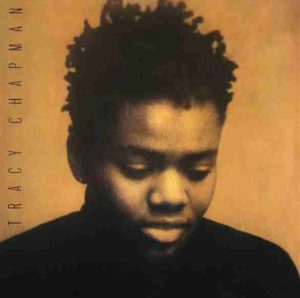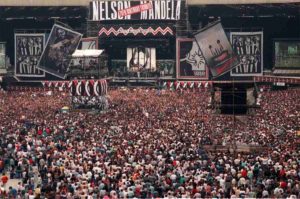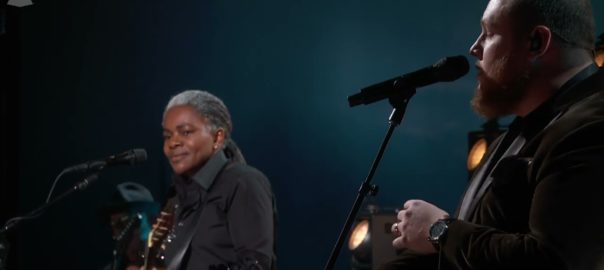
Arriving with little fanfare in the spring of 1988, Tracy Chapman’s eponymous début album emerged as one of the most important and top-selling records of the late 1980s, providing a touchstone for an entire progressive movement of change, while reviving the singer / songwriter tradition.
As with most promising singer-songwriters, comparisons are prone to discussion, and Tracy Chapman’s début garnered mass amounts of media attention.
Of course, Joan Armatrading’s name is frequently mentioned (Tracy Chapman, however, shares little more than race and gender). Her vocal delivery is reminiscent of Joni Mitchell’s folk period; her sensitivity parallels that of Suzanne Vega. Yet Tracy Chapman is not quite so detached from her listener as these influential forebearers were and are (even today).
Tracy Chapman and Luke Combs playing to a rapturous audience at the 2024 Grammy Awards
Tracy Chapman is a fascinating storyteller, her world unlittered by pretense or façade. Consequently, much of the journey often overwhelms with sheer fidelity.

On June 11th 1988, a concert was held for Nelson Mandela’s 70th birthday who was still imprisoned at the time for his anti-apartheid beliefs and activism.
Tracy Chapman, a largely unknown artist who had just released an album, and prior to playing on the stage at Wembley Stadium had played only clubs holding no more than 40 patrons, or as a street musician had performed in front of crowds of no more than 200 hundred, was asked to play Wembley as a “fill in” artist.
Stevie Wonder was scheduled to perform, too, despite not being officially announced, with the Superstition superstar arriving in London early in the morning of the concert. Heading straight to Wembley Stadium after his plane landed, his band were already rehearsing for his set which was due to take place after UB40 had finished their set. But disaster struck, with Stevie refusing to come on stage, leaving the organizers in panic — Wonder realized a crucial piece of his equipment was missing as he walked up the ramp to take the stage.
Although Tracy Chapman had already performed a brief set earlier in the day to a relatively sparse audience, with concert organizers pleading with her to fill the gap left by Stevie Wonder’s absence, a legend was born.
Behind the Wall was the second of what was supposed to be a three-song set.
As the legend goes, serendipity gave the world another glimpse of this commanding artist when Stevie Wonder’s team took their time to ready the stage for his concert, extending Chapman’s set to include almost the entirety of her début album.
With the crew setting up behind her for Stevie Wonder, alone on the massive stage at Wembley Stadium, guitar in hand, she allowed the echoing mic and the screaming of the initially inattentive crowd to amplify the quiet of the song. At first, a little insecure on the biggest stage of her career, as she sang with magnetic calm she built an atmosphere as intimate as each listener’s childhood bedroom, by the end of her first song, Fast Car, the entire crowd was listening in rapt attention.
The low verses mix bleak recognition with quiet hope before building to a chorus so wistful, so joyfully tender it can transport you to a time in your life when you were younger and maybe a little less scared. Most of the people watching her performance at Wembley did not arrive knowing Chapman’s power, and most likely had never heard of her before. But they experienced in real time her ability to lift hearts into people’s throats. She performed her songs the same way she had on the streets for years: alone and brilliantly exposed.
Not only was the Wembley crowd gobsmacked with Tracy Chapman’s performance — with the noisy crowd quietened by Chapman’s compelling presence on stage, and the strength of the songs she played — but playing two sets on the day offered her far more exposure, with an estimated global audience of 600 million for her second performance watching the concert on their televisions at home.
Over the years, we’ve witnessed the worst this world can throw our way, Chapman suggests on her début, at times through her working-class characters. But her music creates a world where no force exists without a counter. The worst of what we’ve endured, she also offers, makes righteous justice inevitable. It’s a worldview that many could appreciate.
By the end of the summer of 1988, a few months after the Nelson Mandela tribute, Tracy Chapman had a platinum selling album, and the singer was a major star.
Before the Wembley Stadium concert, Chapman had sold roughly 250,000 albums. In the two weeks following her performances, she had sold over two million.
In 1989 at that year’s Grammy Awards, Tracy Chapman won Best New Artist, Best Contemporary Folk Album and Best Female Pop Vocal Performance, and had been nominated — and perhaps should have won — for Album of the Year and Record of the Year for Fast Car, which was nominated as Song of the Year, as well.
In time, Tracy Chapman added a backup band. By then, however, Tracy Chapman was on her way to becoming a global phenomenon. The rest is history.
The wondrous Tracy Chapman and Eric ‘slow hand’ Clapton, 1999, performing Give Me One Reason
